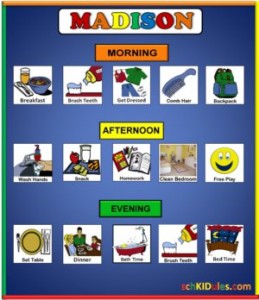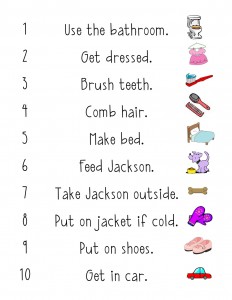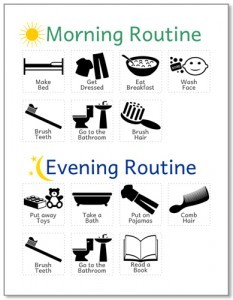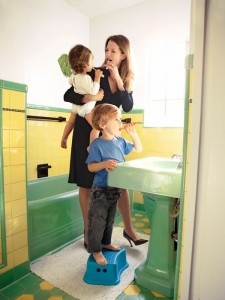A routine can help improve the chaos of family life, and improving the family’s routine, and getting the rest of the gang onboard, can improve the behaviour and independence of your kids.
When designing or re-designing a family’s routine, here are some points to consider:
1) WRITE DOWN YOUR CURRENT ROUTINE AND MAKE IT SEEN
Most parents have the routine stored in their heads and only verbalise it to kids,or ‘nag’ as the kids perceive it. We find that families that write down, let everyone know the routine, make copies and stick it on fridges and bedroom walls,and follow to the same pattern EVERY DAY have much more success. If a routine is written down it’s much easier to identify steps in the routine that can be modified to reduce behaviours. CONSISTENCY OF IMPLEMENTATION is the key!
You can find examples of picture and other types of visual routines all over the internet to steal, modify and blu-tac.
2) CONSIDER THE ORDER OF TASKS-
More effective routines will have tasks that are less interesting or boring for kids first , then an enjoyable/fun activity or time with parents following it. When designing a routine, or sequence of tasks, always think Boring task, Boring task, Fun or rewarding task, instead of the more commonly used and less successful fun, boring, boring, boring. Here’s an example for a Morning routine:
- Breakfast (boring)
- Clean teeth/Brush hair (boring)
- School uniform and shoes on (boring)
- Get to watch tv/play with Lego until it’s time to leave the house ( fun).
Reminding them, the quicker they finish the task the more time they get onto the reward task. Most kids need to experience this on several occasions before it motivates them consistently. So don’t give up and keep at it! Even on days when it all falls to pieces.
3) IF PROBLEM BEHAVIOURS OCCUR OCCUR TRY TO-
Identify the cause of behaviour and acknowledge it to the child (eg you seem tired, you’ve had a bad day today) and
do the boring task with the child so they copy you ,keeping your words to a minimum, rather than telling them what to do if they are already upset.
If you find that these ideas simply don’t work with your children, and/or feel a bit overwhelmed while behaviours worsen, it might be time to contact a psychologist who specialises in parenting skills to help you problem solve and understand other possible reasons causing your child’s behaviour that you you use to inform your routine.




